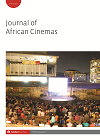- Home
- A-Z Publications
- Journal of African Cinemas
- Previous Issues
- Volume 14, Issue 1, 2022
Journal of African Cinemas - FESPACO@50 - Celebrating the 50th Anniversary of Africa’s Most Important Film Festival and Cultural Event, Nov 2022
FESPACO@50 - Celebrating the 50th Anniversary of Africa’s Most Important Film Festival and Cultural Event, Nov 2022
- Introduction
-
- Articles
-
-
-
FESPACO@50 and beyond: Dialectics of an emancipatory project
More LessThis article is a contribution to the celebration the 50th anniversary of FESPACO. It is divided in two major parts. The first takes stock of some of the most important debates that have traversed the festival since its inception, offers a sense of the significance of the festival and its experience, briefly reviews the Black Camera volumes on FESPACO and introduces the unique essays commissioned for this Special Issue. The second half examines three important issues related to the future of FESPACO and African cinema more generally: the centrality of histories and memories with an examination of the new Classics section of the festival, the extraversion and dependency of the political economies of African cinema, their impact on the forms, circulation and reception of African cinema, and their significance for FESPACO, and, finally the urgent need to address questions of sovereignty and territorial integrity on the continent as sine qua non for the very existence, survival and blossoming of an African film and audiovisual industry, liable to continue and potentially complete the unfinished emancipatory project at the heart of the festival.
-
-
-
-
FESPACO and critical discourse on African cinema
More LessThe Pan-African Film and Television Festival of Ouagadougou (FESPACO) celebrated its golden jubilee at its 26th edition in 2019. This marks a time for reflection and assessment of the future of the festival. The 50th anniversary also represents a key juncture for scholars and practitioners to rethink curatorial practice in Africa to enable film festivals to function also as a medium of production and dissemination of critical discourse on African screen media. FESPACO has a longstanding tradition of continually producing archives of knowledge about African cinema. The study of the relationships between FESPACO and critical discourse on African cinema offers a template for other festivals to follow, thus opening a new discursive space in the emerging field of film festival studies.
-
-
-
Out of the limelight: The privileging of auteurs over actors at FESPACO
More LessBy Joseph PompThis article uses the changing fortunes of actors at the Pan-African Film and Television Festival of Ouagadougou (FESPACO) over the last 50 years as a point of departure to examine how their creative agency and professional opportunities have been delimited by the dominant film culture in West Africa. Taking into consideration the various efforts, such as awards and the organization of colloquia, made by the festival to recognize their work, it argues that the discontinuity of such promotion has kept them overshadowed by directors, for whom the festival was initially established. It examines the iconography of the star as introduced to Africa by commercial imports and deconstructed by filmmakers like Djibril Diop Mambéty and Flora Gomes. This article posits that the transnational circulation of certain key performers within West African cinema bears the promise of a more elaborate network of African film production and distribution to come.
-
-
-
Memory and/in the mirror: FESPACO, a platform for a global Africa?
More LessBy Imruh BakariThe cinema as a medium and an art form has been a major consideration in Africa’s struggles against colonialism. These struggles, which encompass aspirations to establish Africa’s cultural and political autonomy in the postcolonial era, are ongoing. Marking the 26th edition of the Pan-African Festival of Cinema and Television (FESPACO) therefore was considered as an important opportunity for reflection. More so, the occasion was taken as a call to re-engage with the challenge of shaping and transforming ‘the Continent’s greatest cultural event’ for the future. The 2019 festival was launched around the colloquium theme: ‘Confronting our memory and shaping the future of a Pan-African cinema in its essence, economy and diversity’. This article begins with an account of the colloquium and reflects on the knowledge production dimension of the festival, which has been a core component of FESPACO’s identity and existence. It also seeks to situate the event of the 50th anniversary in a continuum of critical discussions about the festival, its past, present and future, and in relation to the seminal aspirations of African filmmakers for an African cinema, its challenges and opportunities.
-
Most Read This Month


